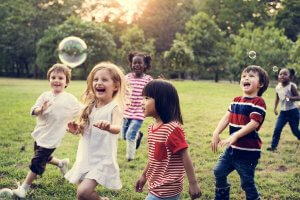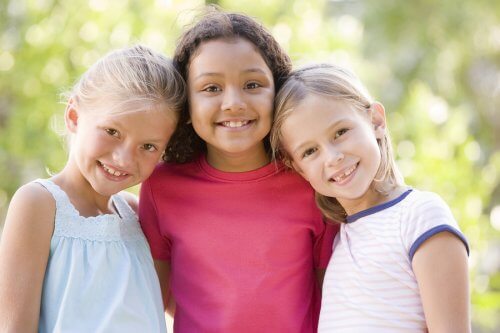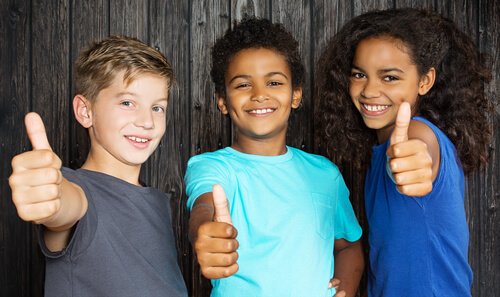Long-Term Benefits of Childhood Friendships

The benefits of childhood friendships are innumerable. Humans are social beings – we live in a community and we need constant collaboration to be able to develop fully.
Friendship is a gift, and one of the most common types of relationships among human beings. Friendships can develop spontaneously and naturally, due to shared interests and values, as well as through mutual understanding and trust.
Keep reading to learn about some of the many long-term benefits of childhood friendships in this article.
Long-term benefits of childhood friendships
Children who are sociable from an early age and who learn to interact in a friendly way with their peers and relatives acquire several advantages. Undoubtedly, they have a head start in learning how to cooperate and develop proper communication skills.
The intention of interacting with others in a friendly way, that is to say in a cordial and cooperative way, arises at the age of two. While children instinctively have an innate bond of empathy towards their parents, they begin to relate to others by their second year of life.

It’s not until the age of 6, coinciding with their first school years, that children begin to form the concept of a “best friend.” This is thanks to the collaboration and closeness that comes from studying and playing with their classmates.
The most obvious benefits of childhood friendships include:
- Helps children become more social and extroverted.
- Reinforces their self-esteem.
- Allows them to learn to share, cooperate, and be respectful towards others.
“He who has a true friend can say that he has two souls.”
–Arturo Graf–
How to foster friendship and social relationships in children
Without a doubt, children have a very active imagination. With it, they manage to have fun even when they’re alone. In addition to having fun, through friendships, children learn certain behaviors of life in a society that will be useful in adulthood.
Some of the benefits of childhood friendships that stand out include learning about leadership, teamwork, solidarity, understanding towards differences, and integration within the framework of diversity.
That’s why it’s important for parents to help foster friendship and social relationships in children.
Now, how can parents collaborate so that children have more and better friendships with their peers? These are some of the tips you can follow:
- Start talking to your children about friendship. Explain its importance, and the many benefits and joys it brings to our lives.
- When your children tell you about their friends, listen to them and offer guidance. Be a guide and encourage them to be understanding and cooperative with their classmates.
- Encourage them to spend quality time with their friends. You can schedule playdates in your home or a park with their friends and allow them to meet frequently. Spending time together regularly will strengthen the bond between them.
- Help them solve conflicts or arguments that may arise. You can take advantage of the occasion to teach them other important concepts and values, like forgiveness and understanding.

Remember to talk about the wrongs of bullying and exclusion
As a final recommendation, when talking with children about friendship and companionship with their peers, it’s necessary to bring up the issue of rejection, exclusion and bullying that children and adolescents can suffer from.
This subject is quite painful and we must alert our children about the emotional and psychological damage that can be inflicted on other people when we attack and reject them. Moreover, it’s important that they also know how to confront it in case they’re the ones suffering.
The benefits of childhood friendships are innumerable. Humans are social beings – we live in a community and we need constant collaboration to be able to develop fully.
Friendship is a gift, and one of the most common types of relationships among human beings. Friendships can develop spontaneously and naturally, due to shared interests and values, as well as through mutual understanding and trust.
Keep reading to learn about some of the many long-term benefits of childhood friendships in this article.
Long-term benefits of childhood friendships
Children who are sociable from an early age and who learn to interact in a friendly way with their peers and relatives acquire several advantages. Undoubtedly, they have a head start in learning how to cooperate and develop proper communication skills.
The intention of interacting with others in a friendly way, that is to say in a cordial and cooperative way, arises at the age of two. While children instinctively have an innate bond of empathy towards their parents, they begin to relate to others by their second year of life.

It’s not until the age of 6, coinciding with their first school years, that children begin to form the concept of a “best friend.” This is thanks to the collaboration and closeness that comes from studying and playing with their classmates.
The most obvious benefits of childhood friendships include:
- Helps children become more social and extroverted.
- Reinforces their self-esteem.
- Allows them to learn to share, cooperate, and be respectful towards others.
“He who has a true friend can say that he has two souls.”
–Arturo Graf–
How to foster friendship and social relationships in children
Without a doubt, children have a very active imagination. With it, they manage to have fun even when they’re alone. In addition to having fun, through friendships, children learn certain behaviors of life in a society that will be useful in adulthood.
Some of the benefits of childhood friendships that stand out include learning about leadership, teamwork, solidarity, understanding towards differences, and integration within the framework of diversity.
That’s why it’s important for parents to help foster friendship and social relationships in children.
Now, how can parents collaborate so that children have more and better friendships with their peers? These are some of the tips you can follow:
- Start talking to your children about friendship. Explain its importance, and the many benefits and joys it brings to our lives.
- When your children tell you about their friends, listen to them and offer guidance. Be a guide and encourage them to be understanding and cooperative with their classmates.
- Encourage them to spend quality time with their friends. You can schedule playdates in your home or a park with their friends and allow them to meet frequently. Spending time together regularly will strengthen the bond between them.
- Help them solve conflicts or arguments that may arise. You can take advantage of the occasion to teach them other important concepts and values, like forgiveness and understanding.

Remember to talk about the wrongs of bullying and exclusion
As a final recommendation, when talking with children about friendship and companionship with their peers, it’s necessary to bring up the issue of rejection, exclusion and bullying that children and adolescents can suffer from.
This subject is quite painful and we must alert our children about the emotional and psychological damage that can be inflicted on other people when we attack and reject them. Moreover, it’s important that they also know how to confront it in case they’re the ones suffering.
All cited sources were thoroughly reviewed by our team to ensure their quality, reliability, currency, and validity. The bibliography of this article was considered reliable and of academic or scientific accuracy.
- Arias Martínez, B. y Fuertes Zurita, J. (1999). Competencia social y solución de problemas sociales en niños de educación infantil: un estudio obser- vacional. Mente y Conducta en situación educativa. Revista electrónica del Departamento de Psicología. Universidad de Valladolid, 1, (1), 1-40.
- Bandura, A. y Walters, R. (1974). Aprendizaje social y desarrollo de la personalidad. Madrid: Alianza.
- Lacunza, A. B., & de González, N. C. (2011). Las habilidades sociales en niños y adolescentes. Su importancia en la prevención de trastornos psicopatológicos. Fundamentos en humanidades, 12(23), 159-182. https://www.redalyc.org/pdf/184/18424417009.pdf
- Michelson, L., Sugai, D., Wood, R. y Kazdin, A. (1987). Las habilidades so- ciales en la infancia: Evaluación y tratamiento. Barcelona: Martínez Roca.
- Ovejero Bernal, A. (1998). Las habilidades sociales y su entrenamiento en el ámbito escolar. En F. Gil y J. León (comp.) Habilidades sociales. Teoría, investigación e intervención (pp. 169-185). Madrid: Síntesis Psicológica.
This text is provided for informational purposes only and does not replace consultation with a professional. If in doubt, consult your specialist.








